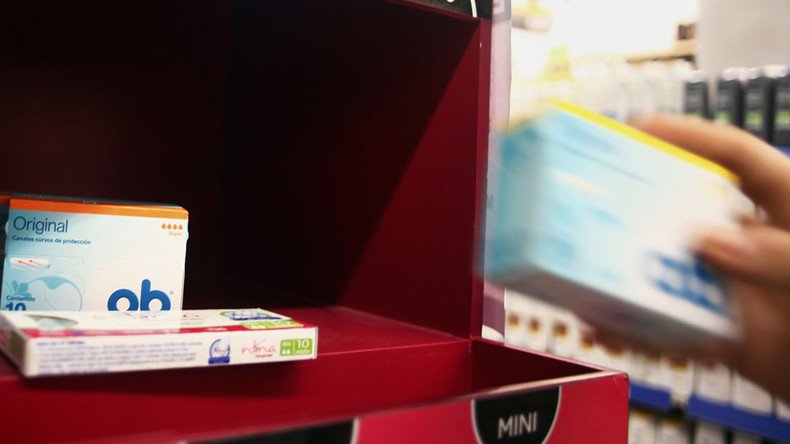NY women fight ‘tampon tax’ in court, accuse state of discrimination

New York women have taken their “tampon tax” fight to court, suing over the taxation of feminine hygiene products, accusing the state of double standards and gender discrimination. They seek to end the “unlawful” tax and force refunds to 5 million women.
“A tax on tampons and sanitary pads is a tax on women. The Tampon Tax is irrational. It is discrimination. It is wrong,” the five plaintiffs ‒ Margo Seibert, Jennifer Moore, Catherine O’Neil, Natalie Brasington and Taja-Nia Henderson ‒ wrote in the class-action complaint, filed in the state Supreme Court in Manhattan.
'Reparations one meal at a time': Satirical app highlights race, gender inequalities https://t.co/MWzGD00WSIpic.twitter.com/qM5oaa5RSB
— RT (@RT_com) February 27, 2016
The women claimed that New York collects about $14 million each year in sales tax on menstrual products from the ‒ in their estimates ‒ the 5 million women who live in the Big Apple, each of whom spends an average of $70 on such items annually.
At the same time, the New York State Department of Taxation and Finance does not impose any taxes on what it defines as medical items, including those that are largely used by men, such as Rogaine or condoms.
“The Department considers Rogaine, foot powder, dandruff shampoo, chapstick, facial wash, adult diapers, and incontinence pads to be medical items. These products are not taxed,” they wrote.
In addition, the plaintiffs argued that the “tampon tax” violates the Equal Protection Clauses of the United States and New York Constitutions.
“The Department imposes a double standard when defining medical items for women and men,” the women wrote. “Medical products exclusively for women are taxed. Medical products also used by men are not.”
Arguing that taxes on tampons and pads harm women, they insisted that menstrual products should be included on the list of items exempt from the sales tax, because those items “are far more necessary” than products the department considers medically exempt.
The 4 percent sales tax is “burdensome” for women who struggle to make ends meet. Forced to use unsanitary and dirty rags, they risk getting infections and diseases, including cancer, the plaintiffs said.
“Defendants should be required to follow the law, and return the many millions of dollars they took illegally at the expense of women’s health,” they wrote.
A spokeswoman for Democratic New York Governor Andrew Cuomo said he believes the tax should be repealed and will work to eliminate it, AP reported.
Currently 40 states in the United States impose a tax on feminine hygiene products. While the “tampon tax” has been eliminated in Pennsylvania and Minnesota, last month legislators voted to uphold it in Utah.













